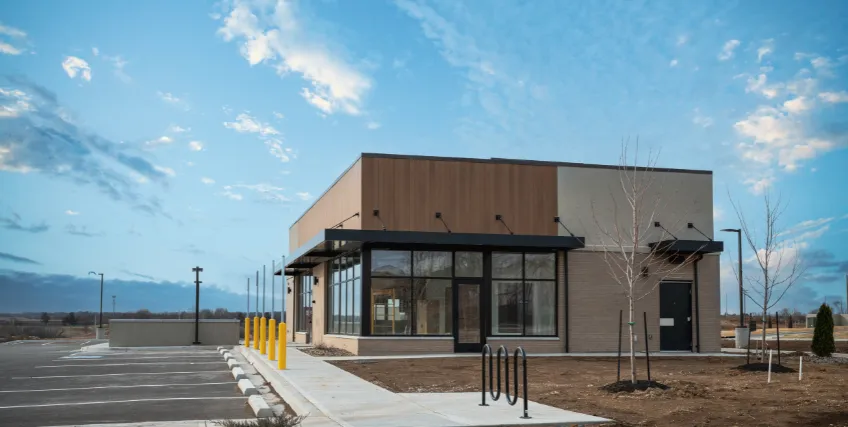Small Business Loans in California Made Easy with Biz2Credit
Access fast and flexible business loans in California for your unique needs.
Why Choose Biz2Credit for Small Business Loans in California?
Biz2Credit has facilitated over $8 billion in small business loans since 2007, supporting more than 200,000 businesses nationwide. In California, where small businesses are the backbone of the economy, accessing the right financing is crucial. We offer tailored financing solutions, including term loans and specialty financing options, to meet diverse business needs. While commercial real estate lenders in California play a vital role in supporting the state's growing businesses, Biz2Credit stands out by offering flexible financing options and personalized service that helps small business owners thrive.
With a streamlined online application process, California entrepreneurs can receive funding decisions swiftly. Our commitment to personalized service and flexible financing options makes us a trusted partner for small business loans in California. Whether you're expanding your business, investing in real estate, or pursuing other financial opportunities, Biz2Credit is here to support your journey.
Our Strengths:

Simplicity

Specialists

Credit Score
Fast Track Your Growth with Small Business Loans in California

Explore Small Business Financing Options in California
A term loan provides a lump sum of capital, repaid over a set period with fixed installments. It can be used to meet a wide variety of business needs, such as expanding business operations, upgrading equipment, managing cash flow, stocking inventory and even funding marketing campaigns or new projects. With this type of business loan in California, you can get upfront funding and boost your business finances too.
But keep in mind, the repayment commitment requires steady cash flow to meet your obligations. If you have a credit score of below 650 or limited time in business, it may affect your chance of loan approval. In some cases, you may be required to secure your loan with collateral and/or a personal guarantee.
- Fund range: $25K-$1M
- Qualification: Qualify automaticallyⓘ after you submit your application
- Credit Score: 650
- Repayment Term: 12-36 months
Revenue-based financing in California is a powerful alternative for small business owners in California who need flexible funding options without the rigid terms of traditional loans. Tailored for businesses with variable revenue streams, this financing solution allows you to secure up to $2 million and above in financing. Your payment amount is calculated based on a percentage of estimated future receivables. This makes it an ideal option for industries like retail and hospitality, which often experience income fluctuations.
For entrepreneurs seeking small business financing in California, revenue-based financing provides quick access to capital to cover essential needs such as purchasing inventory, upgrading equipment, or expanding operations. With minimal requirements and a streamlined application process, businesses in the state of California's funding ecosystem can secure funding without lengthy approval timelines.
Biz2Credit stands out among other financial platforms in California by offering speed, flexibility, and solutions that grow with your business. Whether you’ve been in business for just a few years or are an established enterprise, revenue-based financing is designed to empower your goals and help you succeed in a competitive market. Explore how this option can work for your business needs as an alternative to other commercial loan products in California tailored to your growth aspirations.
- Fund range: $25K-$2M
- Qualification: Create your Biz2Credit account to prequalify.
- Credit Score: 600+
- Repayment Term: Flexible, based on your revenue
Our commercial real estate loans in California are designed to empower small business owners in California to expand or invest in property with confidence. Whether you’re looking to purchase a new location, renovate existing facilities, or refinance existing real estate debt, these loans offer the flexibility and capital you need. With funding amounts ranging from $250,000 to $6 million, businesses across California can access tailored solutions to meet their specific goals.
For those exploring commercial loans in California, Biz2Credit provides competitive interest rates, streamlined approvals, and repayment terms ranging from 12 to 36 months. This makes it easier for entrepreneurs to secure funding for high-value assets without the stress of lengthy application processes. As a trusted name in the industry, Biz2Credit ensures a seamless experience from application to disbursement.
From small businesses in Sacramento to midsized businesses in San Diego, Biz2Credit’s solutions are an ideal choice for those seeking business loans in California that cater specifically to cash out refinance or bridge financing needs. By providing quick approvals and flexible repayment options, Biz2Credit helps businesses navigate the complexities of the state of California's business loans ecosystem while securing the property assets they need to grow. Discover how these commercial real estate loans in California can drive your business forward.
- Fund range: $250K-$6M
- Qualification: Submit your application for review
- Credit Score: 650+
- Repayment Term: 12-36 months
Industry-Based Business Loans in California
Loans in
California
Loans in
California
Loans in
California
Liquor Stores
in California
Loans in
California
Attorneys
in California
for Salons in
California
How to Apply for Small Business Loans in California
Simple steps to secure small business loans in California with Biz2Credit.

Small Business Loans in California Articles
State of California Business Loans: Trends Driving Entrepreneurial Growth
California has one of the strongest business ecosystems in the United States and small businesses play a major part in this growth.
Avoid the Debt Trap: Choosing the Right Loan for Your California Business
Most people will skip, considering that running a business is a path full of challenges. It's not just about working nine to five and logging in and out.
The Ultimate Guide to Small Business Grants: Unlocking Growth Opportunities
You may want to start your own business at times and lead the industry. But as fascinating as it seems, it is not a cakewalk.
Tariff Challenges of Small Business Loans in California
The 2025 tariff surge has significantly reshaped California’s small business landscape, driving up costs for companies that rely on imported materials and equipment.
Why Loan-To-Value Ratio Matters When Borrowing for Commerical Property in California
A loan-to-value ratio is basically a number that will compare your borrowing amount to the value of your home.
How Much Does It Cost to Open a Gas Station in California?
California has some of the highest gas prices in the country and despite global investments in green energy
The Best Financing for Buying an Insurance Agency in California
If you’re looking to become an independent insurance agency but are overwhelmed at the prospect of agency acquisition, it helps to understand
How to Get Restaurant Financing in California
Opening a new restaurant can be a lifelong dream for some entrepreneurs. In fact, 8,694 new restaurants opened their doors in California in 2023 alone
Everything You Need to Know about Financing Your Law Practice in California
Starting your own law practice in California could cost you thousands of dollars. You can try to bootstrap, but depending on your location, goals, and type of practice it can be quite costly.
5 Factors to Consider in Liquor Store Loan in California
Owning a liquor store in California can be very lucrative. However, purchasing one using an inaccurate business valuation could result in significant consequences.
How California Vineyards Can Use Commercial Loans to Fund Smarter Irrigation
California’s wine country has a water problem and it’s not new. With droughts hitting harder and wells running dry, vineyard owners are scrambling to rethink how they irrigate.
Investing in Los Angeles Here’s How Commercial Real Estate Loans in California Can Help
Los Angeles is among the most active and profitable markets in the United States for investing in commercial property.
FAQs on Small Business Loans in California
How can I get a quick business loan for CA if I started business 3-4 years ago?
Getting a quick business loan in California for a business established 3–4 years ago is straightforward with most financing lenders, particularly with Biz2Credit’s tailored financing options. With your operational history, you meet key eligibility criteria for various loan products. Biz2Credit typically requires at least 18 months in business, a minimum annual revenue of $250,000, and a credit score of 650 or higher. These benchmarks demonstrate financial stability and your ability to repay the loan, making you a strong candidate for options like term loans.
To begin, complete a simple online application and upload essential documents such as financial statements, tax returns, and bank statements. Biz2Credit’s streamlined process facilitates decisions within 24 hours for most applicants. You can access term loans ranging from $25,000 to $500,000 with flexible repayment terms of 12 to 36 months. For qualified businesses seeking larger financing, B2C may tailor funding up to 2+M. If your credit score is below 650, you must explore alternative funding options. By preparing accurate financial documents and leveraging the lender’s fast approval system, you can secure the funding needed to drive your California business forward.
How do I get a business loan in California?
Securing a business loan in California is simple with Biz2Credit. Start by checking your financing needs, whether you need the capital for managing cash flow, purchasing equipment, or expanding operations. Biz2Credit offers small business loans in California with a range of terms and repayment options tailored to meet your goals tailored to meet your goals.
Begin by creating an account on Biz2Credit’s platform and completing the online application. You’ll need to provide essential documents such as financial statements, tax returns, and bank statements to showcase your business’s financial health. Eligibility for a business loan typically requires at least 18 months in operation, a minimum annual revenue of $250,000, and a credit score of 650 or higher. Other financing products have other eligibility conditions.
Biz2Credit’s streamlined process ensures quick approvals. With flexible repayment terms and fast access to funding, Biz2Credit empowers businesses across the state to thrive.
What credit score is needed for a commercial loan in California?
Each loan provider has its own credit score requirements for a commercial loan in California. However, typically lenders may require a credit score of 650 or higher. A strong credit score reflects your ability to manage debt responsibly and increases your chances of securing favorable terms. For larger loans, this benchmark ensures financial organizations have confidence in your repayment capacity.
Beyond credit score, Biz2Credit evaluates factors like your annual revenue (minimum $250,000) and time in business (at least 18 months). By preparing accurate financial statements and maintaining a strong credit profile, you can improve your eligibility for various small business loans in California, empowering your business to grow and thrive.
However, if your credit score falls below 650, alternative funding options can be an option too. These loans for small businesses in California have more flexible requirements, making them accessible to businesses with less-established credit histories.
Can I use small business loans in California to buy or upgrade equipment?
Yes, small business loans in California can be used to buy or upgrade equipment important for your business. Many businesses across industries, such as gas stations, restaurants, or salons, need the latest equipment to stay competitive. At Biz2Credit, we understand that upgrading tools and machinery can be a significant investment. That’s why we offer flexible funding options like term loans tailored to equipment needs.
For instance, if you own a gas station, you may need funds for advanced fuel dispensers or maintenance equipment. In this case, our small business loans in California allow you to invest in such upgrades while managing your cash flow effectively.
With business loans ranging from $25,000 to $1 million and repayment terms that align with your revenue, we ensure you have the financial support to grow. Biz2Credit also offers a streamlined application process, so you can receive fast approval and quick access to funds. Whether it’s a one-time upgrade or ongoing equipment needs, our small business loans in California are designed to help your business grow and succeed.
Can I get a pharmacy business loan in California for inventory and expansion?
Yes, Biz2Credit offers specialized small business loans in California for pharmacy owners looking to invest in inventory, expand services, or upgrade their facilities. Pharmacies play a vital role in community healthcare, and staying competitive often requires constant financial investment.
Whether you need funds to stock high-demand medications, hire additional staff, or even remodel your pharmacy, Biz2Credit provides solutions tailored to your needs. Loan options include term loans and niche specialty funding options. With funding amounts ranging from $25,000 to $1 million and flexible repayment terms, you can manage your finances effectively while focusing on serving your customers.
Term Loans are made by Itria Ventures LLC or Cross River Bank, Member FDIC. This is not a deposit product. California residents: Itria Ventures LLC is licensed by the Department of Financial Protection and Innovation. Loans are made or arranged pursuant to California Financing Law License # 60DBO-35839












